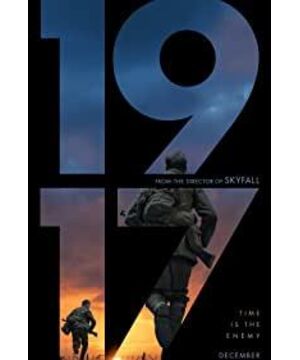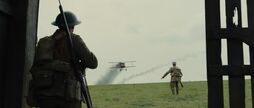In the just-concluded 92nd Oscars ceremony, "1917", which won ten nominations, won only three technical awards. Director Sam Mendes missed the second best director award in his career.
"1917" has always been widely discussed or praised as a technical gimmick that is "one shot to the end" long-lens photography. If this type of strategy appears at European art film festivals, it may not attract such special attention, such as Socorro. Husband’s "Russian Ark", but academic awards such as Oscars have always been more inclined to relatively conservative film styles and themes (although there are no exceptions, such as "Birdman" which won the best picture in 2014), so return "1917" itself, is it really marginalized or deviant like a sunny spring and white snow? In fact, "1917" is a road genre film whose core is highly compatible with mainstream film narrative conventions. Through such a writing method and form breakthrough, it outputs the war view and attitude from the author's memory and consciousness.
The plot of "1917" tells the story of two British soldiers of World War I accepting orders from their superiors, and daring to cross the extremely long front to deliver the order to stop the offensive for the frontline troops to prevent them from falling into the German conspiracy. The core tradition of this movie is because its play completely follows the character relationship model proposed by Vladimir Prop. Several identity tags divide the plot structure into Prop theory. The six narrative units (preparation-disputes-transfer-confrontation-return-acceptance), the specific mapping relationship is very obvious and not much meaning, so I won’t repeat it. In short, the text composition of "1917" is still driving and guiding the audience. It is a very traditional play technique (including audio-visual skills).
The film opens with a quiet and vigorous plain shot, the camera moves backwards, and the two protagonists enter the lens. As they receive the order, the camera continues to pull back, showing the various scenes of the army station and position. At the end, Sco is sitting Under a tree, the background is similar to the plain at the beginning, forming a closed loop. This hint indicates that the film is a highly formalistic war experiment. For the audience, the text composed of two (pseudo) long shots is a novel and abstract experience. The director knows that the real cannot be copied and the history It can’t be copied, so it only ensures the accuracy of the spatial form and details, and does not intend to objectively make the adventure in the plot look real and without traces of creation. On the contrary, every plot is precisely calculated and carefully arranged. As a result, even the combination of composition and photography in a coherent lens movement can be described as all-round exquisiteness. The reason why this does not constitute an aesthetic conflict is that the director actually uses the logical organization material of the road film in the real space to output the ideology.
The logic of the so-called road movie is the purposeful departure of the characters, and the advancement of the plot is synchronized with the linear and uniform movement of the space. During this process, some people and things or conflicts with travel companions are experienced, during which the inner soul or values of the protagonist occur. Subtle changes until the goal is reached, the experience on the road must be symbolic, general, and man-made. The intertwining of these rich images, characters, and stories may distill the meaning of life, or it may be a reflection of the past. The retrospect may have shattered the original firm belief, and "1917" locked the potential logic of war through this set of stereotypes. Therefore, the long shot may not be about the coherence of the real space in the narrow sense, but about putting the narrative of the highway film into reality visually and expressing it in the service of abstract meaning. This set of audio-visual language intends to express what war is like. Rather than what the experience of this action is like, the effect it achieves is a sense of detachment and rational immersion, rather than absolute immersion. Movies can never be able to restore the reality, but movies can capture the essence of reality.
"1917" is a movie with a strong sense of de-ideology, with a distinct anti-war color. A magnificent film title with a sense of grandeur, but also an important year that was full of changes and pushed the First World War to a strategic climax. However, the story did not depict a great battle, nor did it spread the world-dimensional war pattern, let alone Presents cruel and bloody battles and heroic epics. It just allows the audience to follow the two unknown soldiers through two days and one night of running and ups and downs and emotional changes, which constitutes a tragic irony with the title of the film and the understanding of war that people already have.
Examining the motives of the two soldiers for departure, apart from the orders of the superiors, Blanco's determination and urgency was entirely because his own brother was on the front line of danger, and his instinctive consciousness was to save his family. At first, Sco's resistance and prudence due to his a priori realization that the road was difficult and difficult, and his life-threatening death, always formed a reverse tear with Blanco. There is no sense of the righteousness of the family and the noble sense of war mission in both of them, and they all show the side of ordinary people. The initial state of the subconsciousness of the character establishes the passive position of the individual in the war situation and at the same time pave the way for the absurdity of the subsequent character in the war environment.
Sam Mendes continued to emphasize this passiveness through conflict events in subsequent plots, especially the three encounters between the protagonist and the Germans, but in these plots, we can't feel the anger of the enemy and ourselves in traditional war films. He Zhangli, facing the downed German pilots and the German soldiers drunk at night, the protagonist even began to show a kind of human compassion and compassion. The dominant confrontation actually brought him a more desolate and passive situation and a more nihilistic and isolated psychology.
"1917" is most different from mainstream commercial films not in form or dramatic composition, but in that it does not allow the audience to get pleasure from getting close to the target or the crisis is resolved, but to superimpose anxiety as the characters get close to the war. There are no characters in the traditional plot to improve the environment, only the reaction of the environment to people. Although Sco prevented a disaster and the characters achieved their mission, the point of the film was not a victory, but a sense of release after the disaster was saved. In addition, only Sco and Blanco's brothers were relatively speechless. The grief of the individual, the sorrow and joy of the individual replaced the victory or defeat of the country. In Sam Mendes’s concept, there is never a victor in a war, only the passing of life.
Beginning with "Pot Cover", Sam Mendes has been exploring new ways of thinking about war themes, in terms of content and pleasure, eliminating the consumption and exploitation of war scenes by mainstream war films that are contrary to the surface theme orientation. "1917" continues the negative state of character ignorance and audience ignorance, emphasizing sympathy, eliminating pleasure, replacing the macro narrative with an individual's unique perspective, and retaining the ultimate aesthetic experience in form.
View more about 1917 reviews











